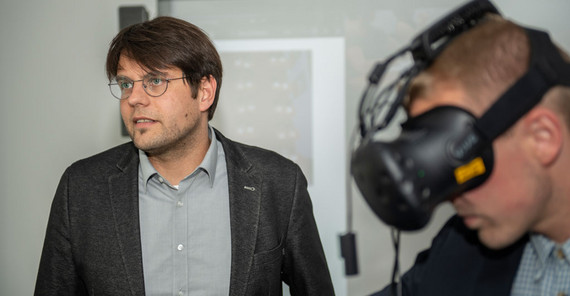Professor Richter, you have been offering a seminar for a while now, in which students can gain experience in teaching in a virtual classroom using VR headsets. Will you also be able to conduct this seminar in the summer semester 2020?
The seminar on classroom disturbances, in which we used the virtual classroom, will also take place in the summer semester. We are currently working on offering the seminar in a completely digital format so that all teaching contents and tasks can be worked on from home. Ironically, we can no longer use the virtual reality technology since students at home have no access to it. For all other classes, we are working on similar concepts and hope to be able to conduct all courses online by the beginning of the semester.
You train young people to become teachers. What role does digitalization play for that?
Teachers-to-be already need to become acquainted with digital learning at their higher education institution. Up until now, the corresponding offers have only been used sporadically and depending on the interests of the respective teaching staff member. That is why our students have only had unsystemiatic contact with e-learning. The current crisis highlights that we have not done enough up until now and will have to increasingly reorganize our teaching to include digital media. We are therefore facing a big challenge in the coming years.
What are the possibilities that exisit for digital teaching and learning?
We already have a great deal of tools for teaching at our disposal today. Many know and use Moodle as a learning platform for on-site courses. However, it is often used as a storage platform only and many features are not taken advantage of. As a matter of fact, Moodle also allows you to conduct synchronous seminars via Adobe Connect or integrate interactive applications via H5P. There also is a range of other apps that facilitate working together and make exchanges on learning content possible (e.g. discordapp.com). Digital apps already offer many possibilities for us today.
In your opinion, how well are schools equipped in that regard?
At several schools, teachers are very active and give their pupils tasks to do at home. Other schools do not provide any homework – this mostly depends on the committment and competences of the teaching staff. To a large extent, there is no uniform electronic infrastructure for communication. This clearly shows once more that it is not enough to provide extensive funding for computer equipment in schools. There is also a need for extensive training of teachers in order for them to be able to adequately handle the technological tools.
What is your assessment of the challenges for teachers to provide online teaching in the current situation?
Teachers are facing a major challenge in this respect, as they have not been systematically prepared for the tasks involved in digital teaching, neither in higher education institutions nor in further education. In addition, schools do not offer the required basic conditions, such as WiFi and uniform communication systems and clouds. In this case, too, it depends to a large extent on the commitment and skills of the individual teacher how well informed he or she is about this topic. In view of the fact that there are an increasing number of older teachers in Brandenburg who are less familiar with digital media, schools in our state are facing particular challenges.
Could the current corona crisis permanently change teaching at institutions of higher education and schools?
The corona crisis clearly shows that we are currently only marginally making use of digital media. In the coming weeks, we are now called upon to develop quick solutions for the current situation that can also be used after the end of the crisis. It can therefore be assumed that in this emergency situation we will develop solutions that will bring about lasting changes in both university and school teaching.
Overview page of all contributions from the University of Potsdam on the corona pandemic

